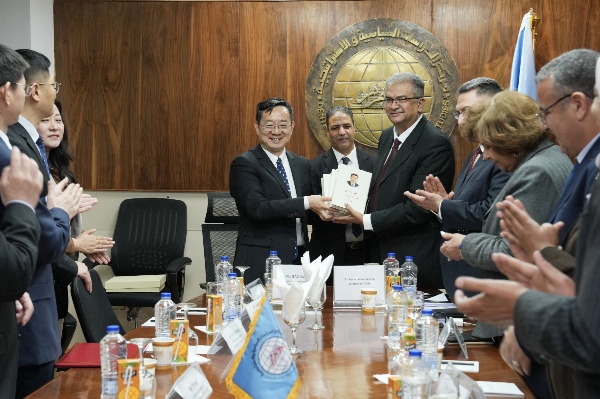

CAIRO—On April 17, Gao Xiang, president of the Chinese Academy of Social Sciences (CASS), led a delegation to visit the Al-Ahram Center for Political and Strategic Studies (ACPSS) in Egypt. During the visit, he held discussions with Ayman El-Sayed Abdel Wahab, director of ACPSS, and other representatives.

On behalf of CASS, Gao Xiang presents ACPSS with the Arabic edition of the first four volumes of Xi Jinping: The Governance of China. Photo: Wang Zhou/CSSN
Gao emphasized that the contemporary era is the most complex and rapidly evolving period in human history. Competing interests continue to emerge and expand, ideological currents clash, hegemonism prevails, and conflicts among nation-states are frequent. The recent technological revolution represented by artificial intelligence (AI) presents both unprecedented opportunities and new challenges. Humanity faces a shared question: “Where are we headed?” In such a critical period, it is more essential than ever for thinkers, statesmen, and elites around the world to contribute their wisdom.
Gao noted out that although China and Egypt are located on different continents and separated by vast geographical distance, they share a number of commonalities. Both countries possess long histories and have nurtured civilizations with profound cultural heritage, rich intellectual legacies, dynamic and innovative traditions of thought, as well as wide-reaching influence. It is imperative to strengthen the collaboration between the intellectual and academic communities of both nations, reflecting on the present and looking to the future through systematic review, transmission, and development of historical experience.
Gao proposed three specific areas for future cooperation: first, establishing joint research teams focused on topics of mutual interest and launching collaborative research projects; second, organizing academic seminars and forums on major international issues, inviting scholars from across the globe to participate, and holding an annual forum alternately in Beijing and Cairo to create a platform for multilateral academic dialogue; third, leveraging the resources of CASS’s 43 research institutes and one university to establish scholar exchange programs—particularly for young scholars—to intensify reciprocal visits and promote more diverse scientific collaboration and people-to-people exchange.
Abdel Wahab warmly welcomed the CASS delegation and emphasized ACPSS’s strong commitment to maintaining friendly relations with its Chinese peers. He expressed great anticipation for deepened cooperation on topics of shared concern and voiced strong agreement with President Gao’s proposals, particularly the emphasis on expanding scholarly exchange, looking forward to sustained development of cooperative initiatives between the two institutions.
Following the discussion, CASS and ACPSS signed a memorandum of cooperation. On behalf of CASS, Gao presented ACPSS with the Arabic edition of the first four volumes of Xi Jinping: The Governance of China.